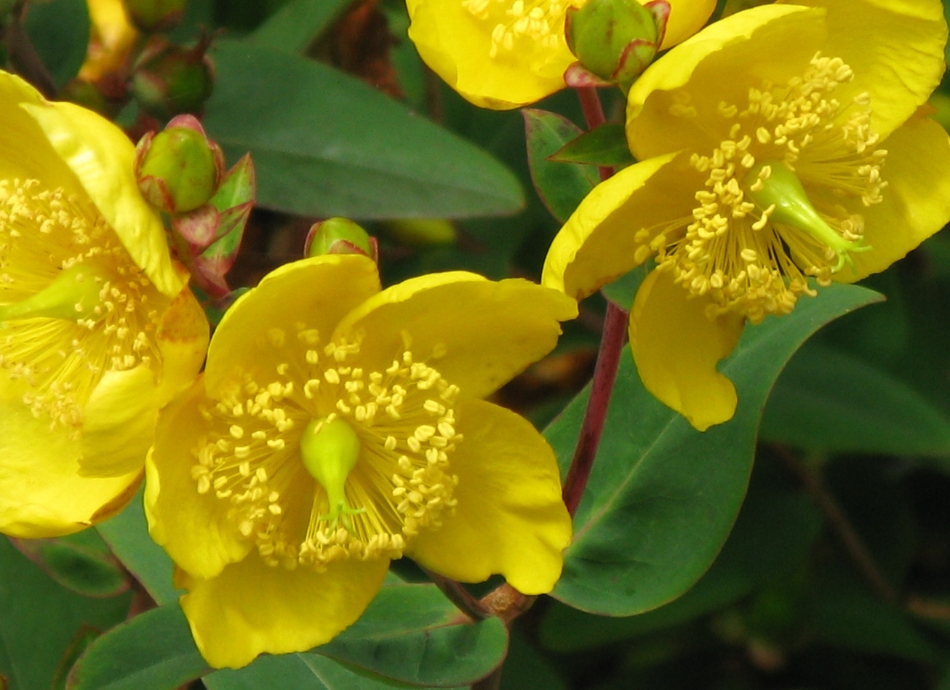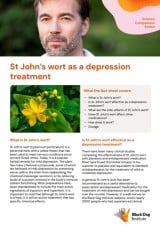You can now add Healthify as a preferred source on Google. Click here to see us when you search Google.
St John’s wort
Also known as Hypericum or Hypericum perforatum
Key points about St John’s wort
- St John’s wort is a herb that's sold as a natural health product in Aotearoa New Zealand.
- It's used for the treatment of mild depression and other conditions such as menopause.
- St John’s wort is also known as Hypericum or Hypericum perforatum.

St John’s wort is a herb. Its flowers and leaves are used to make a plant product marketed for the treatment of depression and other conditions such as symptoms of menopause and pain.
It's also called by it's scientific Latin name, Hypericum or Hypericum perforatum.
How St John’s wort works isn't fully understood but it's believed to affect certain chemicals in your body, such as serotonin and noradrenaline. In this way it's thought to improve mood.
Although St John’s wort is a herb, it contains active ingredients that have specific chemical effects in your body.
St John's wort interacts with medicines used to treat depression and other illnesses. It's important to let your healthcare provider know if you want to try St. John's wort so they can check if it might interfere with other medicines you're taking. Read more about St John's wort interacting with other medicines.
In Aotearoa New Zealand St John’s wort isn't registered as a medicine but is considered a herbal supplement or complementary medicine.
There are no standardised St John's wort preparations in Aotearoa New Zealand. St John's wort is available in a variety of formulations such as tablets, capsules, liquid tinctures and teas from supermarkets, health food stores and pharmacies.
Research has found that St John's wort is useful in the treatment of mild to moderate depression, but it's not effective for severe depression.
In studies comparing St John’s wort with a placebo (sugar pills) and standard antidepressants (SSRIs or tricyclics) the authors found that, compared with placebo, people taking St John’s wort were more likely to have an improvement in their symptoms.
There were no significant differences in depression response rates between St John’s wort and standard antidepressants. The studies also found that patients taking St John’s wort were less likely to drop out of trials due to adverse effects than those taking standard antidepressants.
There are a number of products available on the market containing St John's wort (Hypericum). When buying St John's wort you should be careful about the potency (strength) and purity of the product. In clinical trials, a standardised extract of 0.3% Hypericum is generally used.
St John's wort is possibly effective for menopausal symptoms, plaque psoriasis, wound healing and somatisation disorder. Read the National Institute of Health's information about St John's wort(external link).
Interactions with other medicines
St John's wort interacts with a large number of medicines. In some cases, St. John's wort makes the medicines less effective, and in other cases it may make the effects of a medicine stronger, which can lead to more side effects. Talk with your healthcare provider before starting St John’s wort.
| Examples of some of the medicines that interact with St John’s wort | |
|---|---|
|
|
Note: the above list isn't complete.
You shouldn't use St John's wort if you:
- are a child or young person
- are pregnant or planning a pregnancy
- are breastfeeding
- have attention deficit-hyperactivity disorder (ADHD), Alzheimer’s disease, bipolar disorder, major depression or schizophrenia.
- are taking antidepressants such as SSRIs, such as paroxetine, citalopram, fluoxetine, sertraline or venlafaxine
- are taking triptan medication for migraine, such as sumatriptan or rizatriptan.
If any of these apply to you, talk to your healthcare provider about other treatment options.
Interactions with other supplements
St. John's wort can interact with other herbs and supplements. If you’re taking St. John's wort you should avoid taking any natural health product that can raise your serotonin levels. This includes products containing the amino acids 5-hydroxytryptophan (5-HTP) and L-tryptophan, or the co-enzyme SAMe.
St John’s wort can be taken as tablets and capsules. You can also get it as a tea, and as a liquid called a tincture, which you can take as drops in water. There are additional products available that combine St John's wort with other herbs, such as lemon balm (Melissa officianalis) and hops (Humulus lupulus).
Because St John's wort is classified as a supplement, the strength and dose will vary depending on what brand of St John's wort you take. Always check the dosing instructions on the product label or packaging.
Here are some things to know when you're taking St John's wort. Other things may be important as well, so ask your healthcare provider what you should know about.
The effect of St John's wort isn't immediate. You may need to take it for 2 to 3 weeks before you notice any improvement. If there's no change in your symptoms by then, it’s likely St John's wort won't be of benefit for you and you should talk to your healthcare provider about other ways of managing your symptoms.
Risk of serotonin syndrome
Serotonin syndrome occurs when the level of serotonin in your brain gets too high. It can happen with the use of St John’s wort and some medicines such as SSRIs, or the pain relief medication tramadol.
- You’re at risk of serotonin syndrome if you just started taking or increased the dose of your St John’s wort, or if you’re taking St John's wort with other medicines that also increase serotonin levels.
- Symptoms can range from mild (eg, shivering and diarrhoea) to severe (eg, muscle rigidity, fever and seizures).
- Milder forms of serotonin syndrome may go away within a few days of stopping the medicines that caused your symptoms.
- Severe serotonin syndrome needs hospital admission and can be fatal if not treated.
- Read more about serotonin syndrome.
Withdrawal symptoms
Some people can get withdrawal symptoms when they stop taking St John’s wort suddenly. These include having chills, feeling tired, feeling sick (nausea), feeling dizzy and tense.
St John’s wort has similar properties to prescribed antidepressants. Therefore it’s best to slowly reduce your dose over time to reduce the risk of withdrawal symptoms – especially if you’ve been taking it for longer than a few weeks.
Depression can be a serious illness. If you need help or want to talk to somebody about your mental health, you can get support from any of the following:
- Free call or text 1737 any time for support from a trained counsellor.
- Lifeline 0800 543 354 (0800 LIFELINE) or free text 4357 (HELP).
- Suicide Crisis Helpline 0508 828 865 (0508 TAUTOKO).
- Healthline 0800 611 116.
- Samaritans 0800 726 666.
St John's wort can cause side effects, although not everyone gets them.
| Side effects | What should I do? |
|---|---|
|
|
|
|
|
|
|
|
Read more about medicines and side effects and reporting a reaction you think might be a side effect.
The following links provide further information on St John's wort. Be aware that websites from other countries may contain information that differs from New Zealand recommendations.
Can I take St John's Wort with other medicines?(external link) Medsafe, NZ
St John’s wort(external link) Christchurch Medicines Information Service, NZ
Making sense of St John's wort(external link) Mind, UK
Brochures
St John's wort as a depression treatment(external link) BlackDog Institute, Australia
Medicines and side effects(external link) Healthify He Puna Waiora, NZ, 2024
5 questions to ask about your medications(external link) Health Quality and Safety Commission, NZ, 2019 English(external link), te reo Māori(external link)
References
- Linde K, Kriston L, Rücker G, et al. Efficacy and acceptability of pharmacological treatments for depressive disorders in primary care – systematic review and network meta-analysis(external link) Ann Fam Med. 2015 Jan-Feb;13(1):69–79
- Apaydin EA, Maher AR, Shanman R, et al. A systematic review of St. John's wort for major depressive disorder(external link) Syst Rev. 2016 Sep 2;5(1):148.
- Interactions with St. John's Wort (Hypericum perforatum) Preparations(external link) Medsafe, NZ, 2000
- Opioids and serotonergic medicines – some combinations may increase the risk of serotonin syndrome(external link) Medsafe, NZ, 2022
- St John's wort(external link) Patient Info, UK, 2023
- St John's wort(external link) National Center for Complementary & Integrative Health Clearinghouse, US, 2020
- St John’s wort(external link) Mind, UK, 2022
-
The mental health benefits of St. John's wort(external link) Very Well Mind, US, 2024
Brochures

St John's wort as a depression treatment
BlackDog Institute, Australia, 2022

Medicines and side effects
Healthify He Puna Waiora, NZ, 2024

Health Quality and Safety Commission, NZ, 2019 English, te reo Māori
Credits: Sandra Ponen, Pharmacist, Healthify He Puna Waiora. Healthify is brought to you by Health Navigator Charitable Trust.
Reviewed by: Stephanie Yee, Pharmacist, Auckland
Last reviewed:





